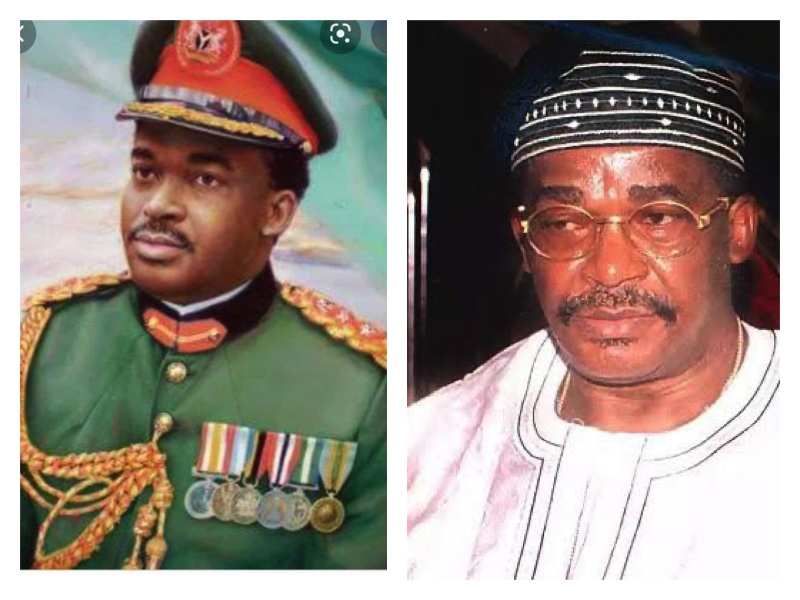General Oladipo Diya Biography, General Oladipo Diya Death, General Oladipo Diya Life, General Oladipo Diya Age, General Oladipo Diya Wife, and General Oladipo Diya news.
Newsone reports that Donaldson Oladipo Diya (born on 3 April 1944) is a retired Nigerian Army, Lieutenant General. From January 1984 to August 1985, he served as Military Governor of Ogun State.
He was the de facto Vice President of Nigeria during the Sani Abacha military junta from 1994 until he was arrested for treason in 1997 as Chief of the General Staff.
During this time, his principal staff officer was Bode George, who went on to have a turbulent career with the People’s Democratic Party after democracy was restored in 1999.
General Oladipo Diya Death
It was reported on 26th March 2023 that Lt. General Oladipo Diya, former Chief of General Staff under the late Head of State, General Sani Abacha, is dead.
His death was announced in a statement by his son, Prince Oyesinmilola Diya, on Sunday morning.
It read;
On behalf of the entire Diya family home and abroad; we announce the passing on to the glory of our dear husband, father, grandfather, brother, Lt-General Donaldson Oladipo Oyeyinka Diya (rtd) GCON, LLB, BL, PSC, FSS, mni.
Our dear Daddy passed onto glory in the early hours of 26th March 2023. Please keep us in your prayers as we mourn his demise in this period. Further announcements will be made public in due course.
Oladipo Diya Biography & Profile Summary
Diya went to Yaba Methodist School in Lagos from 1950 to 1956, then to Odogbolu as a pioneer student from 1957 to 1962. He was also a student at the Nigerian Defence Academy in Kaduna.
Diya studied law while serving in the military, first at Ahmadu Bello University in Zaria, where he earned an LLB, and then at the Nigerian Law School, where he was admitted to the bar as a Solicitor and Advocate of the Supreme Court of Nigeria.
| Full Name | Oladipo Diya |
| Occupation | Politician |
| Age | 79 |
| Date of Birth | April 3, 1944 |
| Place of Birth | Ogun (state), Nigeria |
| Star Sign | Aries |
| Country | Nigeria |
| Gender | Male |
Oladipo Diya Career
Diya joined the Nigerian Army as a direct entry recruit in 1964, having been exempted from the qualifying examination due to his West African Senior School Certificate results. In March 1967, he was commissioned as a Second Lieutenant after three and a half years of intensive military training at the Academy.
Since his commission as a 2nd Lieutenant in the Nigerian Army in 1967, Diya has served in a variety of positions. He was a Platoon Commander of the 6th Battalion, Ikeja, until 1968, when he became the Commanding Officer of the Nigerian Army’s 101 Battalion. Between 1973 and 1976, he was also the Nigerian Army’s Deputy Adjutant-General and Director of Personnel Services.
Brigadier Diya led the Nigerian contingent in the United Nations Interim Force’s Peace Keeping Operations in Lebanon in 1980. During the same time, he was the Chief Military Personnel Officer for the entire United Nations Interim Force in Lebanon.
Oladipo Diya – Coup Attempt Failed
Diya and dissident soldiers in the military allegedly plotted to overthrow Sani Abacha’s regime in 1997. Forces loyal to Abacha uncovered the alleged coup, and Diya and his associates were imprisoned. Diya was tried in a military tribunal and sentenced to death. Diya was not pardoned by Abacha’s successor, Abdusalami Abubakar, following his untimely death in 1998.
Most people believed that the much-hyped coup was a ploy by Abacha to get rid of Diya, who was gaining popularity among the elite and opposition parties for his moderate views on the Nigerian situation. Previously, Abacha’s supporters used bombs to assassinate Diya twice, once at the airport and once in the streets. The arrest of General Diya, however, signaled deep divisions within the Nigerian military and reflected rising tensions over General Abacha’s apparent intention to remain in office by engineering his own election as President, according to most analysts.
According to the late Chief Gani Fawehinmi, a leading Nigerian human rights campaigner, “almost everyone mentioned in the alleged coup was an Abachaboy, an Abacha henchman, so the situation is very funny.” We don’t understand the facts. We want the whole story. The late Chief Fawehinmi was quoted in the Lagos daily The Post Express.
The fact that General Diya and almost all of the others arrested were ethnic Yoruba from the already deeply disaffected southwest was seen by some as a virtual provocation at a time when a country riven by powerful regional rivalries was resuming civilian politicking. General Abacha was a Hausa-speaking northerner, as were his inner circle of senior officers and much of the army’s rank and file.
Oladipo Diya – Death Sentence
Following his arrest, a military tribunal in the Nigerian town of Jos sentenced six people to death by firing squad in April 1998, including Lieutenant General Oladipo Diya. The accused were taken to Jos’ main military barracks for the trial. The men on trial were chained hand and foot during the proceedings because security was tight.
General Diya claimed in a dramatic statement at the start of the trial that he had been entrapped by another officer close to General Abacha, Gen. Ishaya Bamayi, who approached him with the idea of mounting a coup. Due to the sensitivity of the charge, the government then closed the trial to the public. General Victor Malu, the former commander of the West African regional peacekeeping force ECOMOG, said it was not necessary to know who initiated the conspiracy in response to Lieutenant General Diya’s defense that people at the very top framed him.
He observed that all Lieutenant General Diya had to do was demonstrate that he had not been involved in the plot at any point. General Malu promised the defendants a fair trial and unlimited access to the information they needed to defend themselves. This tribunal will not conduct or tolerate an ambush trial, he stated.
The South African government questioned the trial’s secrecy and warned of the possibility of an unfavorable reaction, both in Nigeria and internationally if the sentences were carried out. The sentence was later commuted by Abdusalami Abubakar, who succeeded General Abacha as Head of State.
Personal Life of Oladipo Diya
Newsone Nigeria reports that General Diya was married to two women despite being a Christian and the son of a pastor. On this point, he stated, “The issue of wives varies according to denomination. You belong to a denomination that will not even marry, so if someone mentions two wives and you have one, why don’t you follow the example of the Catholics and not marry at all?
Take a wife, the bible says, for those of you who want to be Canons. In other words, those seeking to be Canons or Bishops should only have one wife. When asked about a woman who married seven brothers from the same family, Jesus replied that there is nothing like marriage in heaven. This issue of marriage concludes here, so the decision about wives is left to individuals as long as one’s heart is pure, as Jesus also stated, “Blessed are the pure in heart, for they shall see God.”
10 Things about late General Oladipo Diya
1. Oladipo Donaldson Diya was born in Odogbolu in Ogun State on April 3, 1944.
2. He joined the Nigerian Defence Academy, Kaduna at a youthful age and was part of the active soldiers who fought during the Nigerian Civil War between July 6, 1967, and January 15, 1970.
3. The late Diya studied Law at the Ahmadu Bello University, Zaria, where he obtained an LLB degree, and then at the Nigerian Law School, where he was called to bar as Solicitor and Advocate of the Supreme Court of Nigeria.
4. Prior to his appointment as Abacha’s second in command, Diya had served as the Chief of Defence Staff and Military Governor of Ogun State from January 1984 to August 1985.
5. In 1993, he was appointed Chief of General Staff and later Vice Chairman of the Provisional Ruling Council in 1994.
6. On December 21, 1997, the regime arrested top army officials including General Diya, Major General Tunji Olanrewaju, Major General Abdulkarim Adisa, and eight others for allegedly plotting to “violently” overthrow Abacha.
7. Just one week before his arrest, Diya had allegedly narrowly missed becoming the victim of a bomb explosion at the Abuja airport when he was on his way to represent Abacha at the funeral of the mother of Major-General Lawrence Onoja in Benue State.
8. Diya in collaboration with Bamaiyi and other notable officers had demanded four things from Abacha when they noticed that he was beginning to nurture the plan to transmute as president for life, which were:
i. That the original draft of the 1995 constitution should be promulgated without the mutilation to which Abacha was subjecting the document.
ii. That the June 12 crisis be resolved and along with it, the release of political prisoners which included the winner of the 12 June 1993 presidential elections, Bashorun MKO Abiola.
iii. That Abacha should make an unambiguous public pronouncement that he had no intention of succeeding himself.
iv. That an attempt to eliminate Yoruba military officers should be terminated.
9. Diya was tried in a military tribunal and was given the death penalty. Fortunately, upon the sudden death of Abacha in 1998, Diya was pardoned by the late Head of State’s successor, Abdulsalami Abubakar.
10. Lieutenant General Diya was not only released but also discharged from the army, stripped of his rank, and barred from using his military title.






